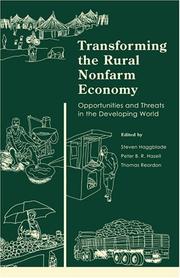| Listing 1 - 7 of 7 |
Sort by
|
Book
Year: 2004 Publisher: Washington International food policy research institute
Abstract | Keywords | Export | Availability | Bookmark
 Loading...
Loading...Choose an application
- Reference Manager
- EndNote
- RefWorks (Direct export to RefWorks)

ISBN: 9780801886638 9780801886645 0801886635 0801886643 Year: 2007 Publisher: Baltimore, Md Johns Hopkins University Press
Abstract | Keywords | Export | Availability | Bookmark
 Loading...
Loading...Choose an application
- Reference Manager
- EndNote
- RefWorks (Direct export to RefWorks)
Industrial economics --- Agronomy --- Service industry --- Developing countries --- Agricultural industries --- Agriculture --- Economic aspects --- Rural conditions --- 330.34 <1-773> --- 330.564 --- 338.432.5 --- Economische ontwikkeling. Regionale economische ontwikkeling--Gebieden in ontwikkeling. Ontwikkelingslanden --- Verdeling van nationaal inkomen. Inkomensverdeling --- Subsidiary activities. Ancillary industries. Nonagricultural production and services --- Social Sciences and Humanities. Development Studies --- Development Economics --- Rural conditions. --- Development Economics. --- 330.564 Verdeling van nationaal inkomen. Inkomensverdeling --- 330.34 <1-773> Economische ontwikkeling. Regionale economische ontwikkeling--Gebieden in ontwikkeling. Ontwikkelingslanden --- Agribusiness --- Industries --- Emerging nations --- Fourth World --- Global South --- LDC's --- Least developed countries --- Less developed countries --- Newly industrialized countries --- Newly industrializing countries --- NICs (Newly industrialized countries) --- Third World --- Underdeveloped areas --- Underdeveloped countries --- Agricultural industries - Developing countries --- Agriculture - Economic aspects - Developing countries --- Developing countries - Rural conditions
Book
Year: 1991 Publisher: Place of publication unknown GEMINI
Abstract | Keywords | Export | Availability | Bookmark
 Loading...
Loading...Choose an application
- Reference Manager
- EndNote
- RefWorks (Direct export to RefWorks)
Organization theory --- Firms and enterprises --- Developing countries
Book
Year: 2001 Publisher: Washington International food policy research institute
Abstract | Keywords | Export | Availability | Bookmark
 Loading...
Loading...Choose an application
- Reference Manager
- EndNote
- RefWorks (Direct export to RefWorks)
Book
Year: 2002 Publisher: Washington (D.C.): International food policy research institute
Abstract | Keywords | Export | Availability | Bookmark
 Loading...
Loading...Choose an application
- Reference Manager
- EndNote
- RefWorks (Direct export to RefWorks)
Book
Year: 2019 Publisher: Washington, D.C. : The World Bank,
Abstract | Keywords | Export | Availability | Bookmark
 Loading...
Loading...Choose an application
- Reference Manager
- EndNote
- RefWorks (Direct export to RefWorks)
Agricultural policymakers in Africa increasingly face the need for policy options based on evidence-based analysis to promote agricultural transformation and to adapt to climate change. Furthermore, data and analytical tools to support informed agricultural policymaking are increasingly abundant thanks to investment in these areas, mostly from external sources. Still, the use of hard data and robust analyses linked to outcomes are still rare in most agricultural policymaking in the region. Today, ministries of agriculture (MoAs) are increasingly under pressure to show ministries of economy and finance (MoEFs) both the rationale behind spending and the impact of past spending, particularly net estimated impacts on forex and fiscal balances. Even so, at present most African governments are still under-spending on agricultural public goods such as research, extension, and infrastructure. The present paper focuses on what can be learned to improve outcomes from experiences promoting the increased use of evidence in agricultural policymaking.
Agricultural Extension --- Agricultural Policy --- Agricultural Research --- Agricultural Sector Economics --- Agriculture --- Climate Change and Agriculture --- Food Security
Book

Year: 1998 Publisher: S.l. République de Madagascar. Institut National de la statistique
Abstract | Keywords | Export | Availability | Bookmark
 Loading...
Loading...Choose an application
- Reference Manager
- EndNote
- RefWorks (Direct export to RefWorks)
| Listing 1 - 7 of 7 |
Sort by
|

 Search
Search Feedback
Feedback About UniCat
About UniCat  Help
Help News
News